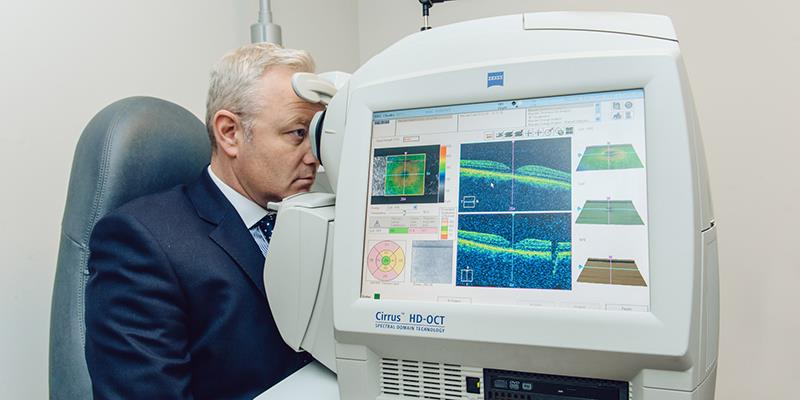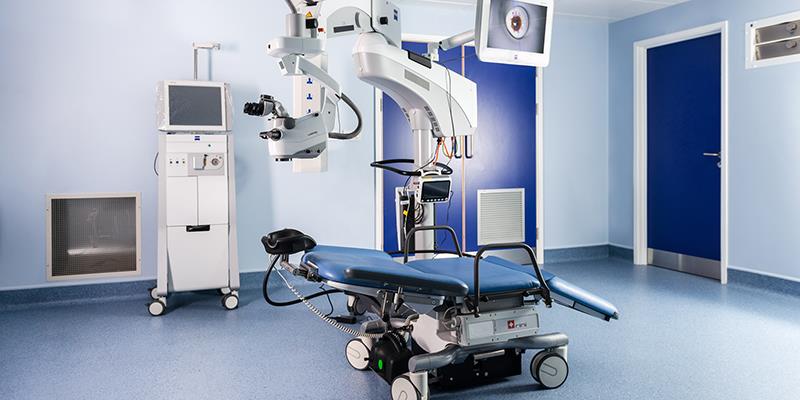It is a truth universally acknowledged that the NHS is being pushed to its limits. Stories of long waits for hospital beds, funding cuts and patient mistreatment often make the headlines, and Optician is no exception. Bill Opticians, featured in our Family Affairs series (27.01.17), offers what it hopes to be the answer.
The million-pound The Medical Eye Clinic in Exeter incorporates a state-of-the-art operating theatre with successful optical chain Bill Opticians, creating an environment which can deliver high quality professional eye care, from standard eye tests to complex optical surgery. It is a partnership run by brothers Charles and James Bill and surgeon Roland Ling.
Plans for the clinic began when Ling, now clinic director, initially approached the brothers with a suggestion to set up a cataract clinic within a Bill Opticians’ practice in Newton Abbot. After further discussion and eventual acquisition of a two storey building, the trio realised they could take the clinic to a larger level and build a specialist theatre.
James says: ‘Whether we should go for it or not was a constant concern, but we could definitely see that the ability for the NHS to service all their cataract patients was getting more difficult. We had an opportunity to do something that certainly very few if any could do before.’
 It is the brothers’ (pictured left) aim to develop a direct referral strategy within the south-west and therefore the clinic’s location is surrounded by Bill Opticians practices of no more than a half-hour drive away.
It is the brothers’ (pictured left) aim to develop a direct referral strategy within the south-west and therefore the clinic’s location is surrounded by Bill Opticians practices of no more than a half-hour drive away.
‘The optical market is changing dramatically, you only have to look at the national picture to understand that something has to change,’ says co-owner Charles Bill. ‘We believe very strongly that eye care is the future for the profession as a whole and therefore amalgamating ourselves into ophthalmology rather than just from a sight testing point of view is key to our future development.’
The brothers believe passionately in community care, particularly in optometrists caring for local NHS patients. ‘I think the NHS system has discouraged help and in the future more clinics are going to have to exist,’ James adds.
Securing contracts
Although registered with both Bupa and AXA PPP Healthcare, James estimates only 20% of the clinic’s patients are private, with the remaining 80% having been referred from NHS hospitals. It is surprising then that the clinic is yet to secure a permanent NHS contract. James says: ‘In the past we have had contracts with hospital trusts in Torbay and Devon and we are trying to help with specific numbers. But we are dealt with by hospitals who have used third parties which have resulted in problems in the past, and therefore they are more unwilling to use us.’

Cirrus HD-OCT unit
The brothers are currently in talks with Clinical Commissioning Groups (CCGs), MPs, and local NHS trusts to come up with a referral pathway which works on a permanent basis. James says: ‘The clinic’s business is all or nothing. At one point we had 500 patients to service, then when the deal ended we were a lot less busy. Our CCG doesn’t do much about the problems they have until it gets to breaking point.’
The Medical Eye Clinic employs surgeons on a locum basis, as well as recruiting staff from Bill Opticians. Currently, most of the surgeries are cataract procedures but the clinic is also trying to get more glaucoma surgeries off the ground.
No expense spared
Designed by the Bill brothers and Ling, the clinic’s layout was originally mapped out by putting masking tape on the floor and following it around to create a ‘patient focused area’. The theatre is designed in one long circle, with a pre-op and anaesthetic room immediately followed by an operating theatre and then a discharge room for patient recovery. A typical cataract procedure will last for an hour-and-a-half from start to finish, with 20 minutes spent in theatre.
In addition to the theatre, the clinic also features a regular Bill Opticians practice downstairs serving patients once they’ve had their surgery. James says: ‘The real push was understanding the size of the building and the fact we had this opportunity to make a difference. It’s a bit like being on a rollercoaster, we are so busy trying to make it all work.’ As well as a clinical rooms upstairs, the space also offers the opportunity to host local optical meetings and events.

The Medical Eye Clinic’s theatre
No expense was spared when it came to equipping the clinic. When the theatre was built 18 months ago, it was the first complete Zeiss cataract suite in the UK, and was the only place to see the bespoke Zeiss equipment being used. The clinic also benefits from an air cleaning system which cleans the air 18 times before surgery. Although not a requirement under NHS procedures, the brothers wanted to have the healthiest environment possible and therefore invested in the bespoke system.

The filtration system cleans the air 18 times before surgery
Lasting legacy
With tonnes of passion, clinical excellence and inevitable heavy investment, has the clinic begun to lighten the burden on the NHS? Charles says: ‘At this point in time the secondary care won’t see any reduction in demand solely because demand is increasing between 10-15% every single year across all eye departments. We have got to look at how we can help support them as time goes on, and it’s very difficult for us to really make an impact at this point in time but I’m striving very hard to work with local CCGs to see if we can do a bit more for them.’
Yet the clinic itself is attracting a growing number of patients through its doors. Charles says: ‘We’ve seen a large increase over the 18 months we’ve been open and would expect this to grow. We are offering special deals with our own patients and looking at other partnerships we can form with like-minded people in the area who would like to access the best care for their patients.’


